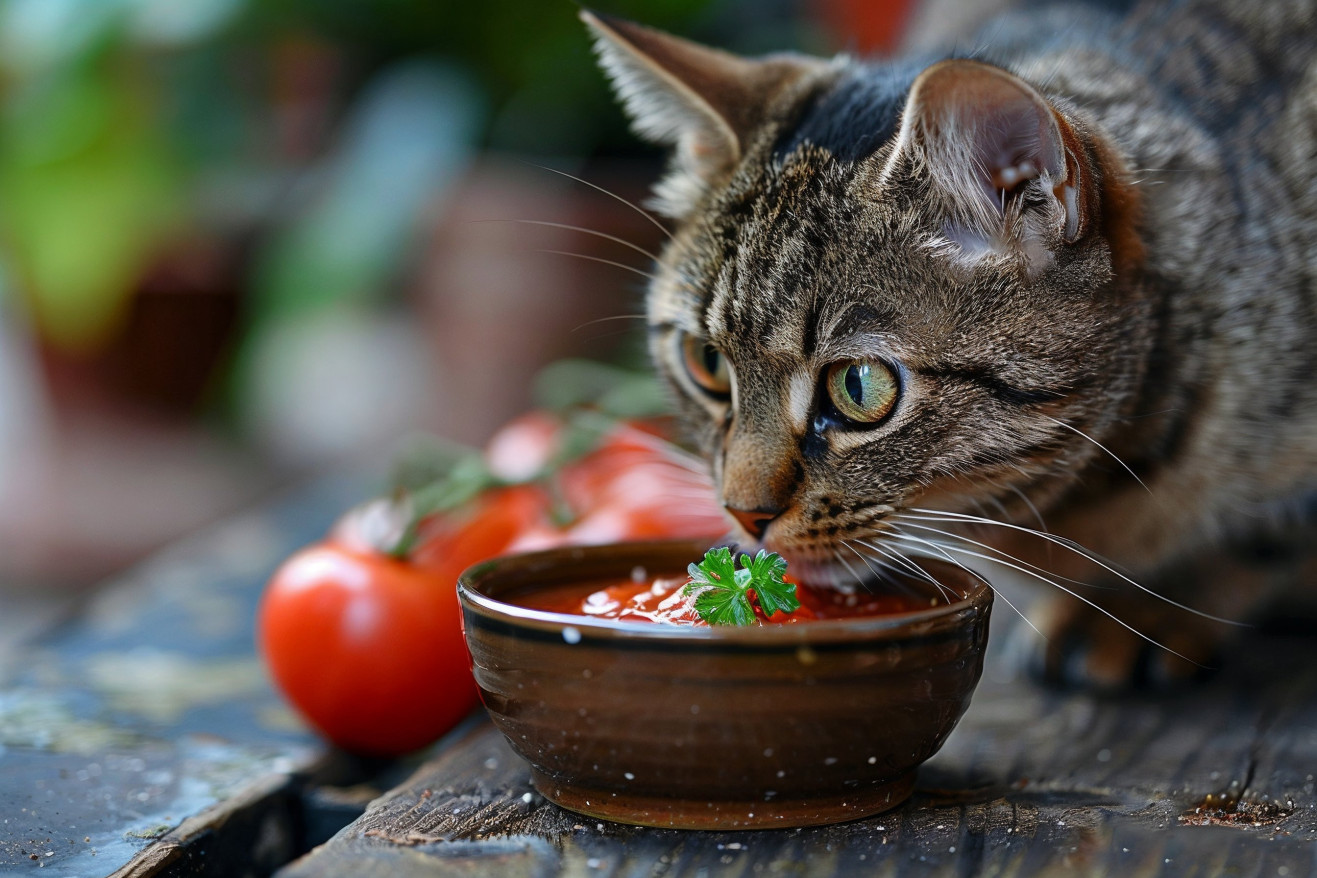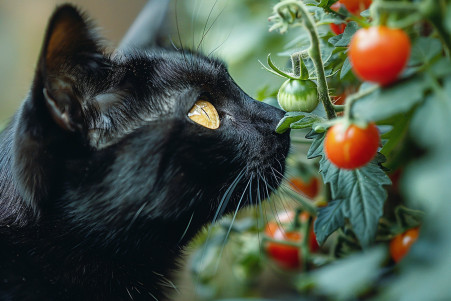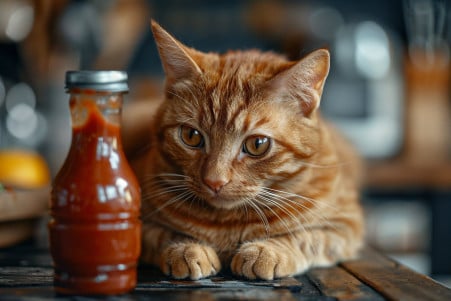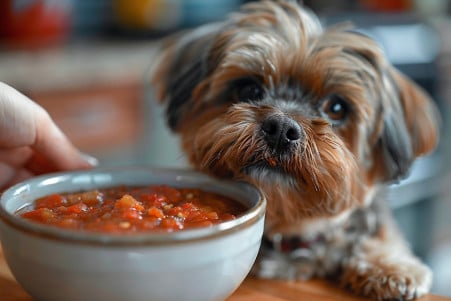Can Cats Have Tomato Sauce? What You Need to Know
30 March 2024 • Updated 30 March 2024

While it's a popular addition to many human meals, you may be wondering if your cat can enjoy tomato sauce with you or if it will just lead to an upset stomach. While cats can have tomato sauce in small amounts, tomatoes contain solanine which can be toxic to cats if they eat too much. So, while a little taste is OK, it's best not to let your cat have it regularly. The acidity can also cause digestive issues.
Because tomato sauce is made with a variety of ingredients, including spices, oils, sugar, and other seasonings, it's best to be cautious about letting your cat have it. In this article, we'll take a look at research from veterinary nutritionists, toxicologists, and feline experts to explain the potential risks and benefits of cats eating tomato sauce and tomatoes. This will help you better understand how to make sure your cat stays healthy while still getting to enjoy an occasional special treat.
Can cats eat tomato sauce?
Tomato Plant Toxicity: Understanding the Dangers
The tomato plant itself, including the leaves, stems, and unripe green tomatoes, contains toxic compounds like solanine and tomatine that can be harmful to cats. If a cat eats any part of the tomato plant other than the ripe fruit, it may show signs of excessive drooling, lack of appetite, diarrhea, vomiting, drowsiness, and central nervous system depression.
In the most serious instances, tomato plant poisoning can result in organ failure, neurological problems, and even potential long-term effects from repeated exposure. Diagnosis usually includes a physical exam, blood and urine tests, and an electrocardiogram (ECG) to determine the severity of the poisoning.
If a cat has eaten parts of the tomato plant, it's important to get them to a vet right away because treatment may include inducing vomiting, giving activated charcoal, providing fluid and electrolyte replacement, and prescribing anti-seizure drugs. To protect your cat, make sure to keep them away from tomato plants and get medical help if they're exposed. This leads nicely into the next section, which covers the risks associated with ripe tomatoes.
Red Tomatoes and Cats: What Are the Risks?
While red tomatoes are safe for cats to eat in ripe form, there are still some risks associated with cats eating them. PetMD notes that tomatoes don't offer any nutritional benefits to cats since they get everything they need from a well-balanced cat diet. If cats eat too many tomatoes or tomato-based products, it can lead to gastrointestinal problems like diarrhea, vomiting, and an upset stomach.
It's also important to make sure that any tomatoes that cats eat are fully ripe because green or underripe tomatoes may still contain solanine and other toxic substances. Because of this, it's generally best to not feed tomatoes to cats at all since the potential dangers outweigh the minimal benefits. This also applies to tomato-based products like tomato sauces, which may contain other ingredients that are toxic to cats.
Tomato Sauce and Other Tomato-Based Products: Hidden Dangers
In addition to tomatoes, commercially prepared tomato sauces often contain other ingredients that are toxic to cats, including garlic, onions, salt, and a variety of spices. CatTime explains that garlic and onions are two of the most common ingredients used in making ketchup and can have seriously negative effects on a cat's health by causing damage to their red blood cells and resulting in anemia.
In addition, the high levels of sugar and sodium in many tomato sauces can be dangerous for cats, leading to issues like dehydration, obesity, and other health problems. Catster points out that the fairly high salt content in ketchup can lead to salt poisoning in cats if they consume too much, which can result in symptoms like vomiting, tremors, and disorientation.
In addition, other tomato-based products like ketchup and other condiments may contain other ingredients like artificial sweeteners and preservatives that are toxic to cats. CatTime notes that xylitol, a common artificial sweetener, may cause poisoning that can lead to seizures, liver failure, and death if not treated quickly enough in cats.
While a small amount of tomato sauce or ketchup may not be immediately dangerous, it's best to avoid feeding these products to cats to prevent any potential health problems. This is also true for other tomato-based foods, since the potential risks are often greater than the minimal rewards.
Potential Risks and Nutritional Concerns
While tomatoes do contain some nutrients that could be beneficial to cats, including fiber, antioxidants, and vitamins C and K, The Wildest notes that these benefits are largely outweighed by the potential risks of feeding them to cats. Cats are obligate carnivores, which means that they require a diet that is primarily made up of animal protein and can get all of the nutrients they need from a well-balanced diet that is formulated for cats without the addition of fruits and vegetables.
If a cat's diet is deficient in certain nutrients, Petco explains that pet parents should work with a vet or a feline nutritionist to make sure that they are making the right changes to their cat's diet or adding the right supplements. Rover.com also notes that in general, it's best to feed cats a high-quality, nutritionally complete commercial cat food and avoid feeding them human food, including tomatoes and tomato-based products, to make sure that they are getting the nutrients that they need.
How to Protect Your Cat and What to Do If Your Cat Eats Tomato
To protect your cat from ingesting tomato plants or tomato-based products, it is important to ensure that these items are not accessible and are stored away from your cat. Catster explains that if your cat has access to a garden or other outdoor space, you should either remove the tomato plants or use cat-safe deterrents to keep your cat from eating them.
If your cat does eat a toxic amount of tomato sauce or any part of a tomato plant, you should take them to the vet immediately. WagWalking explains that you should watch for signs of tomato toxicity, including vomiting, diarrhea, lethargy, and neurological symptoms, and if you notice any of these symptoms, you should take your cat to the vet. Getting your cat medical attention as soon as possible can help reduce the impact of tomato poisoning and prevent more serious symptoms from occurring.
Conclusion: Tomato Sauce and Cats – A Cautious Approach
While ripe tomatoes are likely safe for cats in small quantities, tomato sauce and other tomato-based products are concerning due to the ingredients they contain and the presence of solanine in unripe tomatoes. Cats that eat large amounts of tomato sauce or any part of the tomato plant can develop symptoms that range from gastrointestinal distress to neurological problems, and it's important to seek veterinary care if your cat eats tomato sauce.
To best protect your cat, it's probably best to avoid feeding them tomato sauce and other tomato-based products. Instead, make sure your cat is eating a well-balanced diet that's formulated for cats and ask your vet or a feline nutritionist for help with any dietary questions or changes. By being cautious and focusing on prevention, cat owners can make sure their pets don't experience any of the health problems that can come from eating tomatoes.


